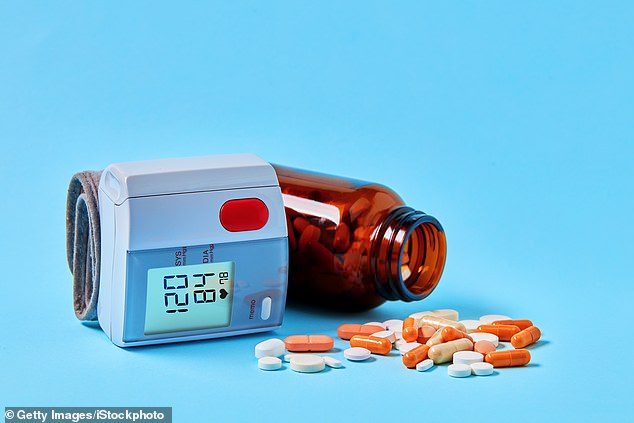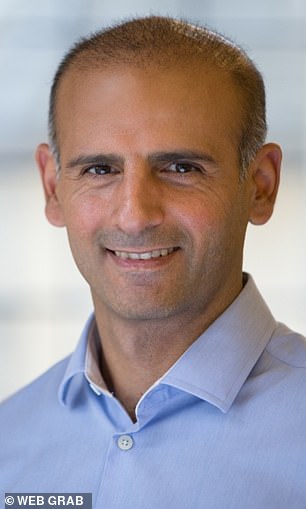Britain’s high blood pressure figures are dizzying. One in four adults is affected by the condition and it is responsible for 75,000 deaths a year.
It raises the risk of heart attacks, stroke, kidney disease and dementia, yet causes no symptoms and so is notoriously difficult to detect.
For every ten people diagnosed, seven had no idea they had it.

Jill Stevenson’s father died of a heart attack aged 58. The 55-year-old journalist, pictured, discovered she had high blood pressure and is now going to take pills for the rest of her life
And so treatment – diet and exercise, as well as daily pills – often begins only after a catastrophe happens, or damage to the heart has already been done.
It’s a challenge that health chiefs have long attempted to tackle. From next month, all over-40s will be offered free blood pressure checks at their chemist, in an attempt to prevent 2,000 deaths over the next five years.
Now some of the UK’s top heart experts have come up with another strategy, which they say will save many more lives. Their suggestion: give blood pressure pills to people with healthy blood pressure levels to prevent problems occurring in the first place.
Earlier this year, a landmark analysis by specialists at Oxford University, involving almost 350,000 volunteers, suggested that lowering blood pressure marginally could prevent hundreds of thousands of heart attacks and strokes every year.
The expert behind the research, Kazem Rahimi, Professor of Cardiovascular Medicine at Oxford, found that for every five-point reduction in a patient’s blood pressure, the risk of a heart attack dropped by ten per cent, stroke by 13 per cent, heart failure 13 per cent, coronary heart disease eight per cent and death from heart-related problems by five per cent.
Crucially, this wasn’t just the case in patients with sky-high readings. The same reduction in risk was seen in patients with healthy blood pressure and no history of cardiovascular trouble.

One in four British adults suffers from high blood pressure. The condition can cause strokes and heart attacks which claim 75,000 lives every year
This surprising finding has led British experts, including Prof Rahimi, to immediately call for international treatment guidelines to be changed so millions more people round the world would benefit from hypertension pills and potentially avoid premature death.
Prof Rahimi explained: ‘Decisions to prescribe blood pressure pills should not be based simply on a prior diagnosis of cardiovascular disease, or a patient’s blood pressure level.
‘We’re not saying that everyone must be put on treatment. That will depend on a patient’s individual risk factors for heart disease. But the current threshold puts too much emphasis on individual blood pressure levels.’
Others say there is now scope to reduce the UK’s threshold for high blood pressure, and perhaps offer treatment to those who may be on the borderline and vulnerable to tipping over the edge.
‘There is certainly growing pressure from many well-respected heart specialists to lower the UK’s thresholds,’ says Dr Terry McCormack, president of the British And Irish Hypertension Society.
‘The UK is at odds with other parts of the world, like some European countries and the US.
‘It’s very likely that offering pills to more people with blood pressure lower than the current threshold would prevent heart attacks and strokes.’

Kazem Rahimi, Professor of Cardiovascular Medicine at Oxford, found that for every five-point reduction in a patient’s blood pressure, the risk of a heart attack dropped by ten per cent, stroke by 13 per cent, heart failure 13 per cent, coronary heart disease eight per cent and death from heart-related problems by five per cent
Most frustrating for doctors is that highly effective tablets are a ‘very low risk’ intervention, with few side effects, and cost as little as 10p each.
Blood pressure, which describes the strength at which your blood pushes on the sides of your arteries as it is pumped around your body, is measured in millimetres of mercury – or mmHg.
If the figure is too high, the blood can strain the arteries and major organs such as the heart. It can also increase the chance of blood clots forming, curbing the oxygen flow to the brain and causing strokes.
Blood pressure measurements produce two numbers; systolic pressure, which measures the pressure in the arteries when the heat beats, and diastolic, or the pressure in arteries when the heart rests between beats.
In the UK, guidelines from the National Institute for Health and Care Excellence say blood pressure above 140 (systolic) and 90 (diastolic) needs treating, either through lifestyle changes or with prescription pills, or both.
GPs have a huge selection of drugs to choose from and may prescribe two or more different types to get on top of the problem.
Usually, if there are no other risk factors for heart disease, such as family history, being older than 65 or previous heart problems, GPs will suggest lifestyle changes before medication – including weight loss, stopping smoking and lowering salt in the diet.
Over the years, the threshold for treating hypertension has fallen, as research has shown the benefits of getting it as low as possible.
‘Thirty years ago it was thought blood pressure was only high and needed treating when a patient had a systolic reading of 180 or more,’ says Professor Naveed Sattar, of the Institute of Cardiovascular and Medical Sciences at Glasgow University. Now some experts think it’s time to embrace the idea of ‘prehypertension’ and take the threshold even lower to treat thousands more patients with systolic readings of 120.
In the US, this has been the threshold since 2017 – anything beyond 120/80 is considered to be elevated and can be treated with medication.
Dr McCormack says: ‘We do things differently to the US. They traditionally offer very intensive treatment for most conditions. But here, prescribing decisions are made on a cost-benefit analysis. And currently we don’t have enough real-life evidence to prove the scale of benefit for the whole country, should we follow a US model.’
Prof Rahimi’s Oxford study, he argues, included a large number of old studies, many of which were not wholly reliable. But the authors disagree, calling it one of the most detailed ever undertaken – and if put into practice, could save lives, especially for high-risk patients.
Dad died of a heart attack at 58… so I was high risk
For 55-year-old Jill Stevenson from Ayrshire, taking a daily pill to reduce her shockingly high levels is a ‘non-event’.
The journalist prided herself on her blood pressure readings for the best part of a decade until, during a spot check-up before enrolling in medical research, it read 180 over 100.
‘I’ve had annual blood pressure readings every year for about ten years because of other medication I take, and it’s always been fine,’ she says.
‘I’m sure it was the menopause that sent things haywire.’
Jill’s GP advised her to lose weight, do more exercise – and monitor her blood pressure at home using a DIY kit.
She was also referred to a cardiologist for further tests.
‘I really didn’t want to go on pills,’ says Jill.
‘I thought I’ll get myself healthier, lose the 10 lb. I knew I should probably shift and start walking a bit more.’
But when results from a heart scan showed a slight abnormality in her beating pattern, she went back to the GP and asked for medication, and was prescribed a 5mg daily dose of diuretic, which was increased to 10mg a few weeks later.
Perhaps, Jill says, she ought to have been taking them years ago – even when her blood pressure was healthy.
‘I was at high risk of having a heart attack or stroke but had no idea.
‘Especially as my father died from a heart attack aged 58, and both my mother and my brother are on pills for high blood pressure.
‘It was actually thinking about my family history that made me realise I probably should be on medication, just in case.’
She now says that taking the medication has been ‘more than worth it’.
‘I realised how ridiculous I was, worrying about taking a little pill every day,’ says Jill.
‘I’ve had no side effects at all and my blood pressure is now pretty much healthy.
‘Most days it’s about 140, and the bottom number is always about 80 or 90, and never over 100 like it used to be.
‘I’ll be taking these pills for the rest of my life – but that’s OK.’
Advertisement
‘At the moment, even if you are high risk for cardiovascular disease, a doctor is unlikely to consider giving blood pressure drugs if it’s below the treatment threshold of 140/90,’ Prof Rahimi says. ‘We need to consider a patient’s overall risk of a heart attack or stroke rather than just focusing on blood pressure numbers.’
Prof Sattar says: ‘Should many more people be on medication? Yes, probably. Many don’t know it’s high but should get it checked. Their GP can work out their ten-year risk of heart disease and, if it’s high, then they may benefit from being put on blood pressure tablets – even if their blood pressure is normal.’
Some experts say the medication is not risk-free.
‘If you lower blood pressure too much there is a bigger risk of falls and fractures, especially in the elderly,’ says Professor Graham MacGregor, who chairs the charity Blood Pressure UK.
Low blood pressure can cause dizziness, blurred vision, nausea and fainting.
A 2014 study at Yale University in the US found those in their 70s and 80s on blood pressure pills were one-and-a-half times more likely to fall and injure themselves – due to drugs lowering their blood pressure too much – than those the same age but not on tablets.
And there are other considerations, if the threshold for drug treatment is to be lowered.
Professor Gavin Sandercock, from the School of Sport, Rehabilitation and Exercise Sciences at Essex University, says there’s no question that reducing blood pressure lowers heart risk. But he adds: ‘Blood pressure drugs commonly have side effects such as dizziness and headaches that can persist in many people the whole time they take them.
‘Some, like ACE inhibitors, which are most commonly used, also cause rashes and a persistent dry cough.
‘The five-point reduction in blood pressure shown in Prof Rahimi’s study is easily achievable with small lifestyle changes in diet and taking regular moderate-intensity physical activity.’
Studies show if you’re overweight, for every two pounds lost, blood pressure can reduce by roughly by one point.
Doing 30 minutes a day of moderately strenuous physical activity – such as walking, jogging, cycling or dancing – has also been found to lower blood pressure by between five and eight points.
But you have to keep it up, as once you stop regular exercise, the blood pressure starts to rise again.
Lowering salt intake has been shown to bring blood pressure down by six points.
But this is not seen for everyone – and it has the biggest impact on people with very high blood pressure.
For 55-year-old Jill Stevenson from Ayrshire, taking a daily pill to reduce her shockingly high levels is a ‘non-event’.
The journalist prided herself on her blood pressure readings for the best part of a decade until, during a spot check-up before enrolling in medical research, it read 180 over 100.
‘I’ve had annual blood pressure readings every year for about ten years because of other medication I take, and it’s always been fine,’ she says.
‘I’m sure it was the menopause that sent things haywire.’
Jill’s GP advised her to lose weight, do more exercise – and monitor her blood pressure at home using a DIY kit.
She was also referred to a cardiologist for further tests.
‘I really didn’t want to go on pills,’ says Jill.
‘I thought I’ll get myself healthier, lose the 10 lb. I knew I should probably shift and start walking a bit more.’
But when results from a heart scan showed a slight abnormality in her beating pattern, she went back to the GP and asked for medication, and was prescribed a 5mg daily dose of diuretic, which was increased to 10mg a few weeks later.
Perhaps, Jill says, she ought to have been taking them years ago – even when her blood pressure was healthy.
‘I was at high risk of having a heart attack or stroke but had no idea.
‘Especially as my father died from a heart attack aged 58, and both my mother and my brother are on pills for high blood pressure.
‘It was actually thinking about my family history that made me realise I probably should be on medication, just in case.’
She now says that taking the medication has been ‘more than worth it’.
‘I realised how ridiculous I was, worrying about taking a little pill every day,’ says Jill.
‘I’ve had no side effects at all and my blood pressure is now pretty much healthy.
‘Most days it’s about 140, and the bottom number is always about 80 or 90, and never over 100 like it used to be.
‘I’ll be taking these pills for the rest of my life – but that’s OK.’
Source link : https://www.dailymail.co.uk/health/article-10004187/Should-healthy-Britons-given-blood-pressure-tablets.html











